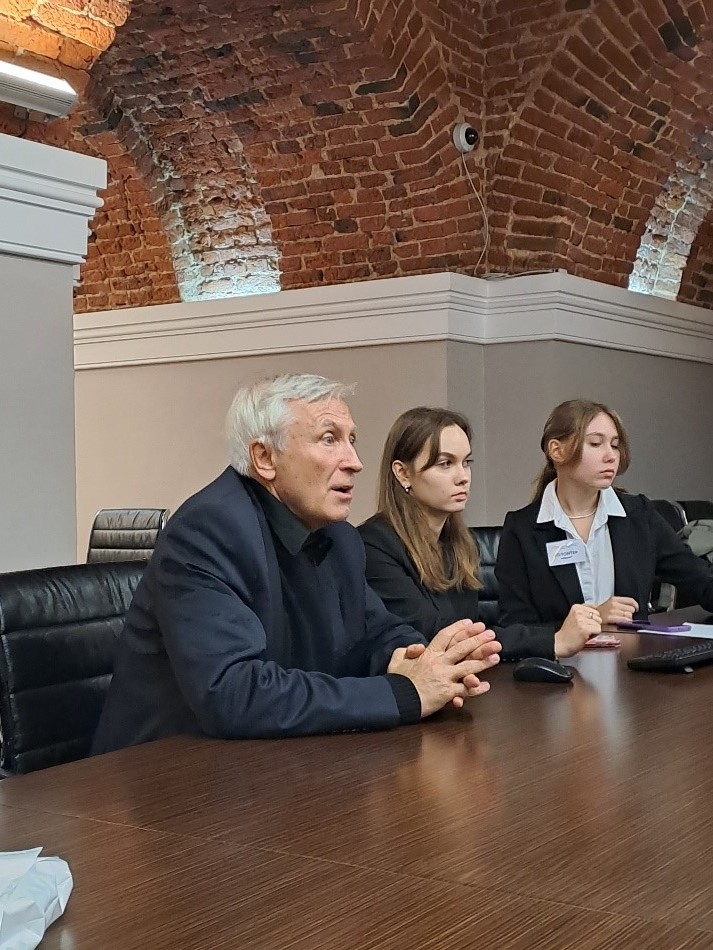On October 4, 2023, as part of the international forum “Russia and Iberoamerica in a Turbulent World: History and Modernity”, held at the School of International Relations of St. Petersburg State University, the presentation of the collective monograph “The Palgrave Handbook of Malicious Use of AI and Psychological Security” took place. The presentation was attended by the editor and co-author of the publication – DSc., professor Evgeny Pashentsev, leading researcher at the Diplomatic Academy of the Ministry of Foreign Affairs of the Russian Federation, and other representatives of the international author’s team.

The session was held offline in English with the online connection of selected speakers. At the beginning of the presentation, Prof. Evgeny Pashentsev introduced the team and outlined the relevance of the research. He stated that the main focus of the monograph is on new threats to psychological security arising from the malicious use of artificial intelligence (AI), as well as the possibilities of using AI to counteract such threats. Studies of the malicious use of AI through the use of deepfakes, agenda setting, sentiment analysis, affective computing, etc., give a clear picture of the various forms and methods of malicious influence of AI on the human mind and through this on political, economic, cultural life, the activities of state and non-state institutions. Evgeny Pashentsev pointed out the multilevel structure of the book, including theoretical, problem-oriented, regional, and prognostic components, and also drew attention to the five chapters devoted to the threat of malicious use of AI in the BRICS countries.

Speaking about the monograph’s preparation process, Evgeny Pashentsev especially emphasized the broad international interdisciplinary composition of the team: 23 specialists from 11 countries representing both social and technical sciences.
Further presentation of the book included comments and statements of the authors of individual chapters. Dr. Pierre-Emmanuel Thomann (Catholic Institute of Vendée – Lyon), the author of the chapter “Geopolitical Competition and the Challenges for the European Union of Countering the Malicious Use of Artificial Intelligence”, outlined the urgent need to study the problems of malicious use of AI through the prism of geopolitics and the growth of international confrontation.

Darya Bazarkina, DSc, leading researcher of the Institute of Europe of the Russian Academy of Sciences, co-author of four chapters, and author of the chapter “Current and Future Threats of the Malicious Use of Artificial Intelligence by Terrorists: Psychological Aspects”, noted the importance of studying the practice of the malicious use of AI by marginalized and terrorist groups.

Dr. Marius Vacarelu from the National School of Political and Administrative Studies (Bucharest), author of the chapter “Malicious Use of Artificial Intelligence in Political Campaigns: Challenges for International Psychological Security for the Next Decades”, noted the importance of public discussions and scientific research on the problems of malicious use of AI for the improvement of legal systems and the development of civil governance.

Evgeny Pashentsev noted that preparing the book allowed the international team to include young researchers in a major international project.
Yury Kolotaev, Assistant Professor at the School of International Relations of St. Petersburg State University, who was completing his postgraduate studies at the time of the book’s preparation, noted during the presentation of his chapter that he pursued a crucial task of bringing together humanitarian knowledge and expertise with the advanced technological industry. Such a task was faced to one degree or another by all the authors of the book.
At the monograph presentation, the official manuscript reviewer, Greg Simons (Turiba University – Latvia), noted the prospect of such research and the need for further development of the problem of the malicious use of AI in an interdisciplinary way.
Professor Konstantin Pantserev, head of the master’s program “Artificial Intelligence and International Security” at the School of International Relations of St. Petersburg State University, invited to the presentation, expressed a similar position. From his point of view, the monograph will be a necessary addition to the curriculum, serving as a helpful instrument in the student’s skills and knowledge development in this area.

In conclusion of the presentation, Evgeny Pashentsev thanked the whole team for their work and invited all the participants of the event to participate in the section “Malicious Use of Artificial Intelligence and the Challenges of Psychological Security for BRICS”, held the next day as part of the Forum.



 0
0 2833 Views
2833 Views 17 October 2023
17 October 2023 Yury Kolotaev, Assistant Professor at the Department of European Studies, School of International Relations, St. Petersburg State University
Yury Kolotaev, Assistant Professor at the Department of European Studies, School of International Relations, St. Petersburg State University 